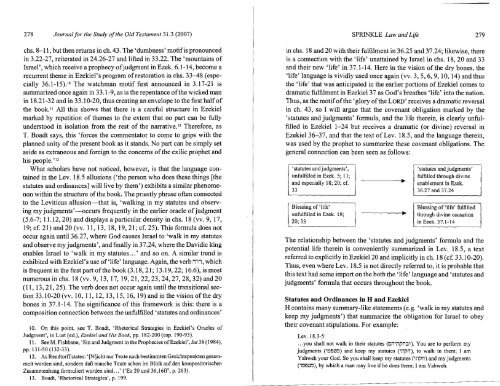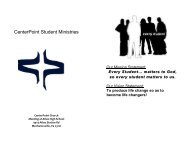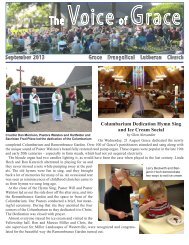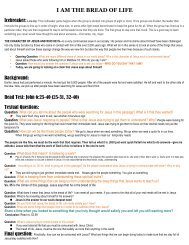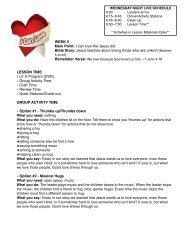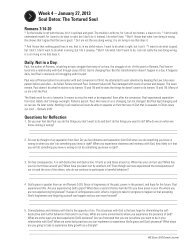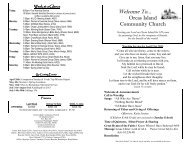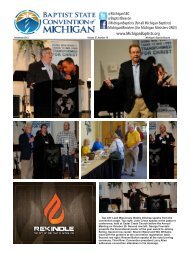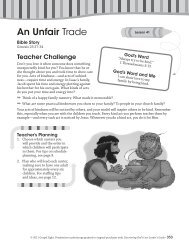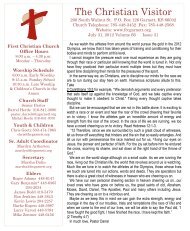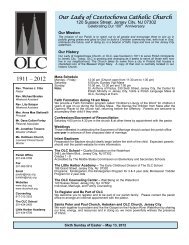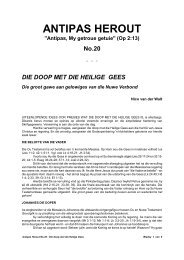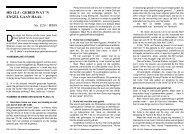Law and Life: Leviticus 18.5 in the Literary Framework of ... - Clover
Law and Life: Leviticus 18.5 in the Literary Framework of ... - Clover
Law and Life: Leviticus 18.5 in the Literary Framework of ... - Clover
You also want an ePaper? Increase the reach of your titles
YUMPU automatically turns print PDFs into web optimized ePapers that Google loves.
278 Journal for <strong>the</strong> Study <strong>of</strong> <strong>the</strong> Old Testament 3 1.3 (2007)<br />
chs. 8-1 1, but <strong>the</strong>n returns <strong>in</strong> ch. 43. The 'dumbness' motif is pronounced<br />
<strong>in</strong> 3.22-27, reiterated <strong>in</strong> 24.26-27 <strong>and</strong> lifted <strong>in</strong> 33.22. The 'mounta<strong>in</strong>s <strong>of</strong><br />
Israel', which receive a prophecy <strong>of</strong>judgment <strong>in</strong> Ezek. 6.1-14, become a<br />
recurrent <strong>the</strong>me <strong>in</strong> Ezekiel's program <strong>of</strong> restoration <strong>in</strong> chs. 3348 (especially<br />
36.1-15).1° The watchman motif first announced <strong>in</strong> 3.17-21 is<br />
summarized once aga<strong>in</strong> <strong>in</strong> 33.1-9, as is <strong>the</strong> repentance <strong>of</strong> <strong>the</strong> wicked man<br />
<strong>in</strong> 18.21-32 <strong>and</strong> <strong>in</strong> 33.10-20, thus creat<strong>in</strong>g an envelope to <strong>the</strong> first half <strong>of</strong><br />
<strong>the</strong> book." All this shows that <strong>the</strong>re is a careful structure <strong>in</strong> Ezekiel<br />
marked by repetition <strong>of</strong> <strong>the</strong>mes to <strong>the</strong> extent that no part can be fully<br />
understood <strong>in</strong> isolation from <strong>the</strong> rest <strong>of</strong> <strong>the</strong> narrative.12 Therefore, as<br />
T. Boadt says, this 'forces <strong>the</strong> commentator to come to grips with <strong>the</strong><br />
planned unity <strong>of</strong> <strong>the</strong> present book as it st<strong>and</strong>s. No part can be simply set<br />
aside as extraneous <strong>and</strong> foreign to <strong>the</strong> concerns <strong>of</strong> <strong>the</strong> exilic prophet <strong>and</strong><br />
his pe~ple."~<br />
What scholars have not noticed, however, is that <strong>the</strong> language conta<strong>in</strong>ed<br />
<strong>in</strong> <strong>the</strong> Lev. <strong>18.5</strong> allusions ('<strong>the</strong> person who does <strong>the</strong>se th<strong>in</strong>gs [<strong>the</strong><br />
statutes <strong>and</strong> ord<strong>in</strong>ances] will live by <strong>the</strong>m') exhibits a similar phenomenon<br />
with<strong>in</strong> <strong>the</strong> structure <strong>of</strong> <strong>the</strong> book. The priestly phrase <strong>of</strong>ten connected<br />
to <strong>the</strong> <strong>Leviticus</strong> allusion-that is, 'walk<strong>in</strong>g <strong>in</strong> my statutes <strong>and</strong> observ<strong>in</strong>g<br />
my judgmentsy--occurs frequently <strong>in</strong> <strong>the</strong> earlier oracle <strong>of</strong> judgment<br />
(5.6-7; 11.12,20) <strong>and</strong> displays a particular density <strong>in</strong> chs. 18 (vv. 9, 17,<br />
19; cf. 21) <strong>and</strong> 20 (vv. 11, 13, 18, 19,21; cf. 25). This formula does not<br />
occur aga<strong>in</strong> until 36.27, where God causes Israel to 'walk <strong>in</strong> my statutes<br />
<strong>and</strong> observe my judgments', <strong>and</strong> f<strong>in</strong>ally <strong>in</strong> 37.24, where <strong>the</strong> Davidic k<strong>in</strong>g<br />
enables Israel to 'walk <strong>in</strong> my statutes.. .' <strong>and</strong> so on. A similar trend is<br />
exhibited with Ezekiel's use <strong>of</strong> 'life' language. Aga<strong>in</strong>, <strong>the</strong> verb 7'n, which<br />
is frequent <strong>in</strong> <strong>the</strong> first part <strong>of</strong> <strong>the</strong> book (3.18,21; 13.19,22; 16.6), is most<br />
numerous <strong>in</strong> chs. 18 (vv. 9, 13, 17, 19,21,22,23,24,27,28,32) <strong>and</strong> 20<br />
(1 1, 13,21,25). The verb does not occur aga<strong>in</strong> until <strong>the</strong> transitional section<br />
33.10-20 (vv. 10, 11, 12, 13, 15, 16, 19) <strong>and</strong> <strong>in</strong> <strong>the</strong> vision <strong>of</strong> <strong>the</strong> dry<br />
bones <strong>in</strong> 37.1-14. The significance <strong>of</strong> this framework is this: <strong>the</strong>re is a<br />
composition connection between <strong>the</strong> unfulfilled 'statutes <strong>and</strong> ord<strong>in</strong>ances'<br />
10. On this po<strong>in</strong>t, see T. Boadt, 'Rhetorical Strategies <strong>in</strong> Ezekiel's Oracles <strong>of</strong><br />
Judgment', <strong>in</strong> Lust (ed.), Ezekiel <strong>and</strong>His Book, pp. 182-200 (esp. 190-93).<br />
1 1. See M. Fishbane, 'S<strong>in</strong> <strong>and</strong> Judgment <strong>in</strong> <strong>the</strong> Prophecies <strong>of</strong> Ezekiel', Inr 38 (1984),<br />
pp. 13 1-50 (1 32-33).<br />
12. As Rendtorff states: '[Nlicht nur Texte nach bestimmten Gesichtspunkten gesammelt<br />
worden s<strong>in</strong>d, sondern daR manche Texte schon im Blick auf den kompositorischen<br />
Zusammenhang formuliert worden s<strong>in</strong>d.. .' ('Ez 20 und 36,16ff, p. 263).<br />
13. Boadt, 'Rhetorical Strategies', p. 199.<br />
SPRINKLE <strong>Law</strong> <strong>and</strong> <strong>Life</strong> 279<br />
<strong>in</strong> chs. 18 <strong>and</strong> 20 with <strong>the</strong>ir fulfilment <strong>in</strong> 36.25 <strong>and</strong> 37.24; likewise, <strong>the</strong>re<br />
is a connection with <strong>the</strong> 'life' unatta<strong>in</strong>ed by Israel <strong>in</strong> chs. 18'20 <strong>and</strong> 33<br />
<strong>and</strong> <strong>the</strong>ir new 'life' <strong>in</strong> 37.1-14. Here <strong>in</strong> <strong>the</strong> vision <strong>of</strong> <strong>the</strong> dry bones, <strong>the</strong><br />
'life' language is vividly used once aga<strong>in</strong> (vv. 3,5,6,9,10,14) <strong>and</strong> thus<br />
<strong>the</strong> 'life' that was anticipated <strong>in</strong> <strong>the</strong> earlier portions <strong>of</strong> Ezekiel comes to<br />
dramatic fulfilment <strong>in</strong> Ezekiel 37 as God's brea<strong>the</strong>s 'life' <strong>in</strong>to <strong>the</strong> nation.<br />
Thus, as <strong>the</strong> motif <strong>of</strong> <strong>the</strong> 'glory <strong>of</strong> <strong>the</strong> LORD' receives a dramatic reversal<br />
<strong>in</strong> ch. 43, so I will argue that <strong>the</strong> covenant obligation marked by <strong>the</strong><br />
'statutes <strong>and</strong> judgments' formula, <strong>and</strong> <strong>the</strong> life <strong>the</strong>re<strong>in</strong>, is clearly unfulfilled<br />
<strong>in</strong> Ezekiel 1-24 but receives a dramatic (or div<strong>in</strong>e) reversal <strong>in</strong><br />
Ezekiel 36-37, <strong>and</strong> that <strong>the</strong> text <strong>of</strong> Lev. <strong>18.5</strong>, <strong>and</strong> <strong>the</strong> language <strong>the</strong>re<strong>in</strong>,<br />
was used by <strong>the</strong> prophet to summarize <strong>the</strong>se covenant obligations. The<br />
general connection can been seen as follows:<br />
unfulfilled <strong>in</strong> Ezek. 5; 1 1 ;<br />
<strong>and</strong> especially 18; 20; cf.<br />
unfulfilled <strong>in</strong> Ezek. 18;<br />
20; 33<br />
fulfilled through div<strong>in</strong>e<br />
36.27 <strong>and</strong> 37.24<br />
through div<strong>in</strong>e causation<br />
<strong>in</strong> Ezek. 37.1-14<br />
The relationship between <strong>the</strong> 'statutes <strong>and</strong> judgments' formula <strong>and</strong> <strong>the</strong><br />
potential life <strong>the</strong>re<strong>in</strong> is conveniently summarized <strong>in</strong> Lev. <strong>18.5</strong>, a text<br />
referred to explicitly <strong>in</strong> Ezekiel 20 <strong>and</strong> implicitly <strong>in</strong> ch. 18 (cf. 33.10-20).<br />
Thus, even where Lev. <strong>18.5</strong> is not directly referred to, it is probable that<br />
this text had some import on <strong>the</strong> both <strong>the</strong> 'life' language <strong>and</strong> 'statutes <strong>and</strong><br />
judgments' formula that occurs throughout <strong>the</strong> book.<br />
Statutes <strong>and</strong> Ord<strong>in</strong>ances <strong>in</strong> H <strong>and</strong> Ezekiel<br />
H conta<strong>in</strong>s many summary-like statements (e.g. 'walk <strong>in</strong> my statutes <strong>and</strong><br />
keep my judgments') that summarize <strong>the</strong> obligation for Israel to obey<br />
<strong>the</strong>ir covenant stipulations. For example:<br />
Lev. 18.3-5:<br />
...y ou shall not walk <strong>in</strong> <strong>the</strong>ir statutes (D;r'ni)i731). You are to perform my<br />
judgments ('E39tUn) <strong>and</strong> keep my statutes ('npn), to walk <strong>in</strong> <strong>the</strong>m; I am<br />
Yahweh your God. So you shall keep my statutes ('npn) <strong>and</strong> my judgments<br />
('t39[tP3), by which a man may live if he does <strong>the</strong>m; I am Yahweh.


